Tariffs explained on T-shirts


Scott Lincicome, an international trade attorney from Texas, is using T-shirts to educate the public about the trade issues between China and the US.
Lincicome, an adjunct scholar at the Cato Institute in Washington, said that he was inspired by a picture of a woman wearing a pro-tariffs T-shirt on Twitter. So he decided to make his own, according to a recent interview with Politico.
The T-shirt he saw on Twitter said something like "Tariffs are great!"
Lincicome's is a bit wordier: "Tariffs Not Only Impose Immense Economic Costs But Also Fail To Achieve Their Primary Policy Aims And Foster Political Dysfunction Along The Way".
"It's time we fought back," Lincicome tweeted when his T-shirts were first released in March.
To clarify how tariffs make the US worse off, he later designed a two-sided version of his shirt with an x-y axis graph on the back that explains a fundamental economic principal:
Tariffs harm social welfare because consumer surplus decreases for raised price more than what some producers and the government gain from tariffs, which creates "dead weight loss".
One and a half months after the release, he tweeted that "over 700 originals sold". The T-shirts sell for $16.99 to $22.49 on Amazon, and the page says any profits (around $3 each) go to FEE.org, a non-profit promoting economics education.
A photo of Republican Senator Orrin Hatch of Utah, one of the first buyers, holding a T-shirt appeared on CBN News in April.
Another customer, teacher Rob Szarka, left a review on Amazon: "It's too early to report on whether wearing it in class has improved my students' understanding of chapter 9 of Mankiw's Principles of Economics, but I believe the bright red color I ordered did help them stay awake at8 am today."
In the interview with Politico, Lincicome said he created the T-shirt to memorialize a trade policy dilemma.
"The protection side has a three-word issue: 'Trade kills jobs'; whereas the other side comes back and says: Actually the composition of jobs changes and we get better jobs, and by that point the audience is falling asleep," he told Politico.
He also pointed out that the T-shirts aren't made in China, but are still made overseas, because he would like the US to focus on jobs with higher value rather than the textile industry.
"We trade guys hate to use the term trade war but I think that at this stage we're still in trade dispute or trade skirmish; we will shift into trade war I think if this big tranche — this $200 billion — ends up getting implemented," said Lincicome, who turned down an interview request from China Daily.
On Tuesday evening, the Trump administration confirmed that an additional 25 percent tariffs on $16 billion Chinese imports will be implemented on Aug 23, hitting $50 billion in total.
In response, China announced it would put the same amount of tariffs on $16 billion in US products including auto and energy products.
Early this month, the Trump administration said the tariff rate on another $200 billion in Chinese imports may rise to 25 percent from the planned 10 percent. A public hearing will be held from Aug 20 to 23 in Washington.
Ying Wang in Washington contributed to the story.




































